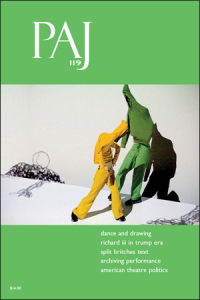Microdramas: Crucibles for Theater and Time by John H. Muse (review)
PAJ: Performing Arts Journal, 40.2
 Opening section
Opening section
It seems appropriate that in our current moment – as we scroll through Instagram or watch brief videos on Snapchat – that a theatre scholar would seek meaning and profundity in short plays. After all, people’s attention spans are reportedly growing shorter and shorter, and more and more theatre syllabi are assigning one-act plays as a way to keep students interested in the material. But John H. Muse argues that shortness has felt modern since at least the late nineteenth century, that increasingly brief time spans have long seemed, to artists and audiences both, to reflect the pace of modern life. Muse’s Microdramas has a simple thesis: Short plays, despite their brevity, perhaps even because of it, deserve close attention. The argument is straightforward, but Muse’s book, like the plays and performances he explores in such detail, is filled with surprising insights.
Muse begins by exploring the modernist interest in short theatrical events. Theatre practitioners in the Naturalist, Symbolist, and Futurist movements all, for various reasons, turned their attention to shortened drama. Although these modernist movements are often understood in opposition to one another, Muse argues that their use of the short play for their experiments produced pieces with strikingly similar dramaturgies and characters. One of the key early insights of Microdramas is that the very medium of theatre gives weight to what it represents; as Muse puts it, “theatrical attention makes matter matter.”




Leave a Reply
Want to join the discussion?Feel free to contribute!